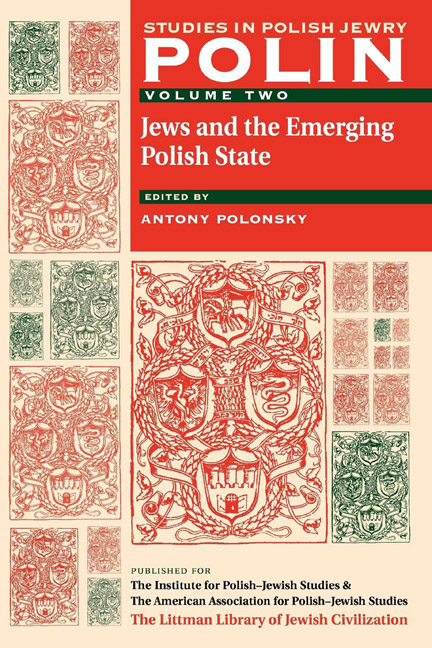Book contents
- Frontmatter
- Dedication
- Editors and Advisers
- Contents
- Polin: Studies in Polish Jewry
- Polin
- Statement From the Editors
- SYMPOSIUM: JEWS AND THE EMERGENCE OF AN INDEPENDENT POLISH STATE
- ARTICLES
- DOCUMENTS
- COMMENTARY
- The Poor Poles Look at the Ghetto
- Polish-Jewish Relations During the Second World War: A Discussion
- REVIEW ESSAYS
- BOOK REVIEWS
- Leiter to the Editors
- Contributors
- Obituaries
The Poor Poles Look at the Ghetto
from COMMENTARY
- Frontmatter
- Dedication
- Editors and Advisers
- Contents
- Polin: Studies in Polish Jewry
- Polin
- Statement From the Editors
- SYMPOSIUM: JEWS AND THE EMERGENCE OF AN INDEPENDENT POLISH STATE
- ARTICLES
- DOCUMENTS
- COMMENTARY
- The Poor Poles Look at the Ghetto
- Polish-Jewish Relations During the Second World War: A Discussion
- REVIEW ESSAYS
- BOOK REVIEWS
- Leiter to the Editors
- Contributors
- Obituaries
Summary
On more than one occasion Czesław Miłosz has spoken in a perplexing way of the duty of Polish poetry to purge the burden of guilt from our native soil which is - in his words -‘defiled, blood-stained, desecrated’. His words are perplexing, because one can only be held accountable for the shedding of blood which is not one's own. The blood of one's own kind, when shed by victims of violence, stirs memories, arouses regret and sorrow, demands repect. It also calls for remembrance, prayer, justice. It can also allow for forgiveness, however difficult this may be. The blood of the other, however, even if spilt in a legitimate conflict, is quite another matter but it also does not involve desecration. Killing when in self-defence is legally condoned, though it is already a departure from Christian moral law: Christ ordered Peter to put away his sword. Whenever blood is spilt it calls for reflection and penance. Not always, however, can it be said to desecrate the soil.
What Milosz means here is neither the blood of his compatriots nor that of the Germans. He clearly means Jewish blood, the genocide which - although not perpetrated by the Polish nation - took place on Polish soil and which has tainted that soil for all time. That collective memory which finds its purest voice in poetry and literature cannot forget this bloody and hideous stigma. It cannot behave as if it never happened. Occasionally one hears voices, especially among the young, who were not emotionally involved in the tragedy, saying: ‘We reject the notion of collective responsibility. We do not have to return to the irrevocable past. It is enough if we condemn this crime in toto as we do with any injustice, any act of violence.’ What I say to them is this: ‘Our country is not a hotel in which one launders the linen after the guests have departed. It is a home which is built primarily on memory; memory is at the core of our identity. We cannot dispose of it at will, even though as individuals we are not directly responsible for it. We must carry it within us even though it is unpleasant or painful. We must also strive to expiate it.’
- Type
- Chapter
- Information
- Jews and the Emerging Polish State (Polin Volume Two) , pp. 321 - 336Publisher: Liverpool University PressPrint publication year: 2008

